
Former Secretary of Energy Ernest Moniz: Tackling Global Warming and Energy Solutions
Energy is complicated. As global demand continues to grow, so does the need for realistic, climate-friendly solutions. Are renewables the answer? How about nuclear power? What is China’s role? Listen, as former Energy Secretary Ernest Moniz provides smart answers to daunting questions about energy, and examines the threat of nuclear war.

Top Takeaways of 2024
The episode you’ve been waiting for is here: our Top Takeaways of 2024. Listen to some of the world’s smartest, most influential thinkers, business leaders, innovators, technologists, and other newsmakers — including Eric Schmidt, Mellody Hobson, Atul Gawande, Fareed Zakaria, Jill Abramson, Stephen Breyer, Niall Ferguson and others. You don’t want to miss this episode.

AI: How It’s Being Used Now, What’s Next, and What’s After That
There’s a lot being said about AI these days that’s science fiction. One person who knows the facts is David Schmaier, President and Chief Product Officer of Salesforce. Here, he talks in detail about the many unseen ways AI is being used now, how it will profoundly stimulate innovation and benefit humanity, the rise of robots, and more.

The Search for Another Earth
Is there another planet in the universe like Earth? Is there life elsewhere? And if so, how advanced is it? Join us as Sara Seager — astronomer, planet hunter, MIT professor, and MacArthur Genius Grant recipient — presents a mind-blowing progress report on the rigorous search for Earth’s planetary twin and other life in the universe.

A Blueprint for Reimagining Our Cities
Our cities need to be revitalized to make them more appealing. But how? Seth Pinsky, the former CEO of New York City's Economic Development Corporation, has answers. Here, he talks knowingly about creative ways to stimulate growth; how to combat the skepticism that government can deliver on its promises; the importance of what he calls magnetic infrastructure; and more.
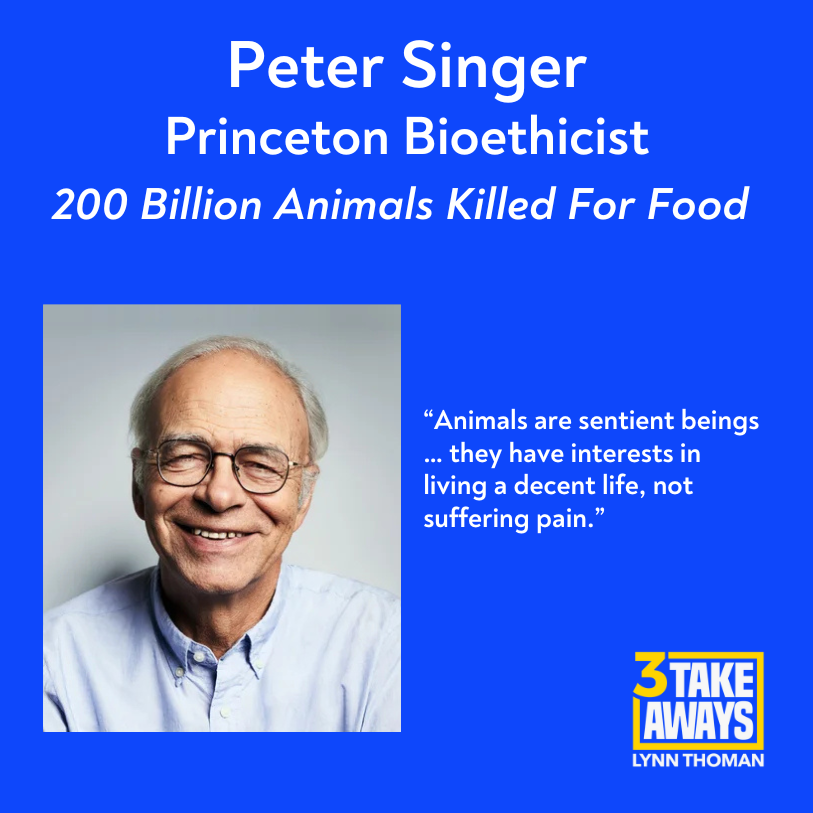
200 Billion Animals Are Killed for Food Each Year
Chew on this: Approximately 200 billion animals are raised for food each year, often in horrific conditions. The contribution of these animals to climate change is greater than the emissions of all the cars being driven around the world. There is a solution. Listen, as Princeton bioethicist Peter Singer explains both the problem and a simple answer.
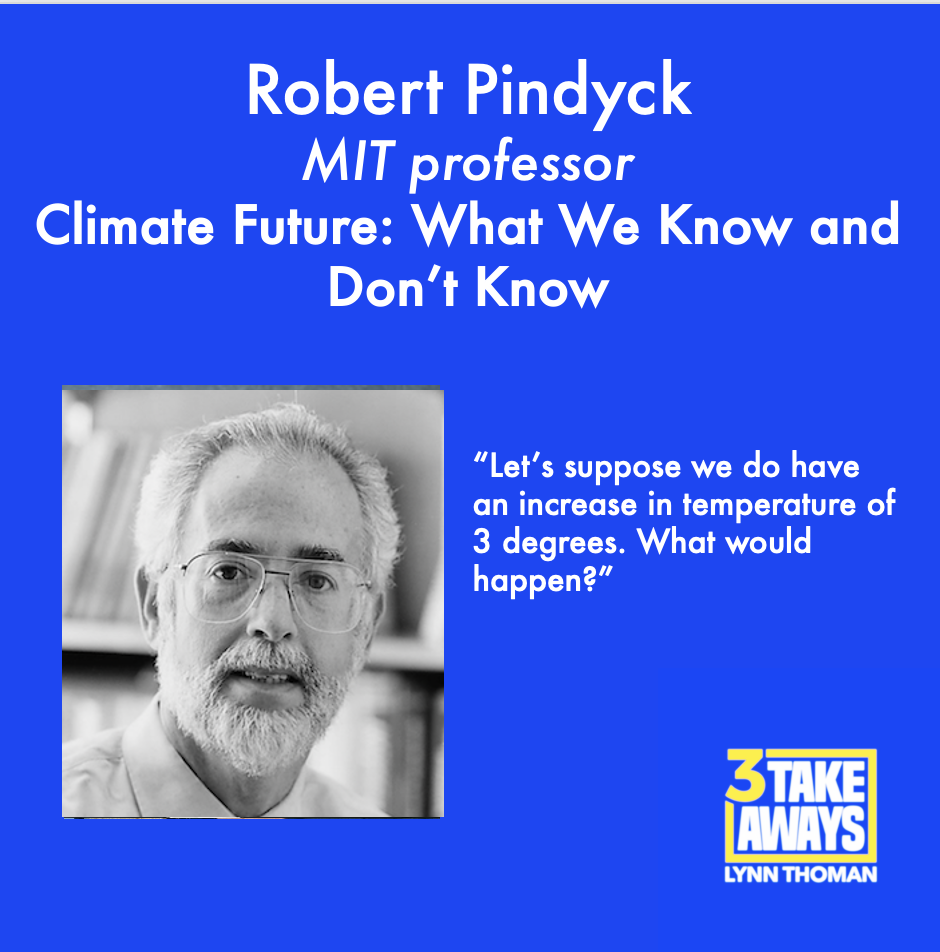
Climate Future: What We Know and Don’t Know About Our Future
Current debates over climate change are focused almost entirely on reducing emissions - which is something we should do - but we also need to answer the question, how should we be adapting?
MIT’s Robert Pindyck shares what we know and don’t know and how we can adapt given the enormous climate uncertainty.
“Let’s suppose we do have an increase in temperature of 3 degrees. What would happen?”

Top Takeaways of 2023
3 Takeaways brings you conversations with people who are changing the world. The world’s foremost thinkers, business leaders, writers, politicians, scientists and other newsmakers share three key insights to help you understand the world in new ways that can benefit your life and career. In this special year-end episode, we present the most powerful and compelling takeaways of 2023.
Can you guess which takeaway is from each guest before we tell you who it is? The guests include former Director of the CIA, former Vice Chairman of the Joint Chiefs of Staff, CEO of Chevron, former Foreign Minister of Israel and other amazing guests.
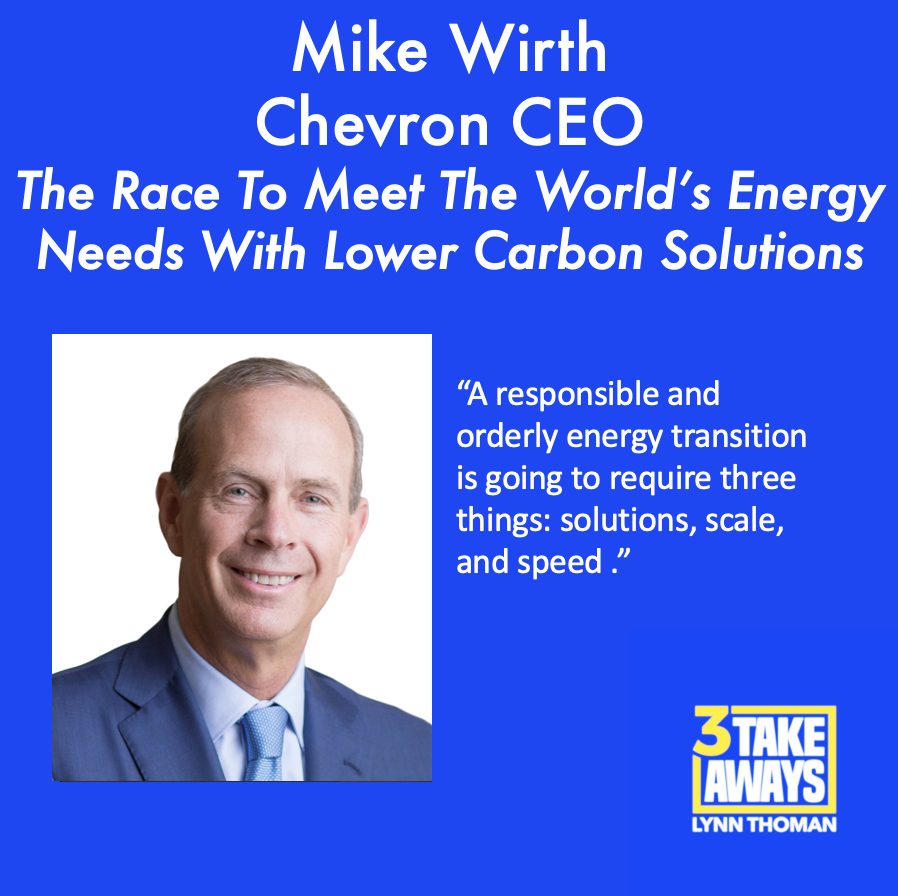
Chevron CEO, Mike Wirth, On The Race To Meet The World’s Energy Needs With Lower Carbon Solutions
Can the world make an orderly transition from fossil fuels to lower carbon solutions? Chevron CEO, Mike Wirth, believes we can, but there are major challenges ahead. Join us as he shares his thoughts on EVs, fusion, carbon capture, geothermal, and other technologies. The future is coming. Will the world be ready? Listen to find out.
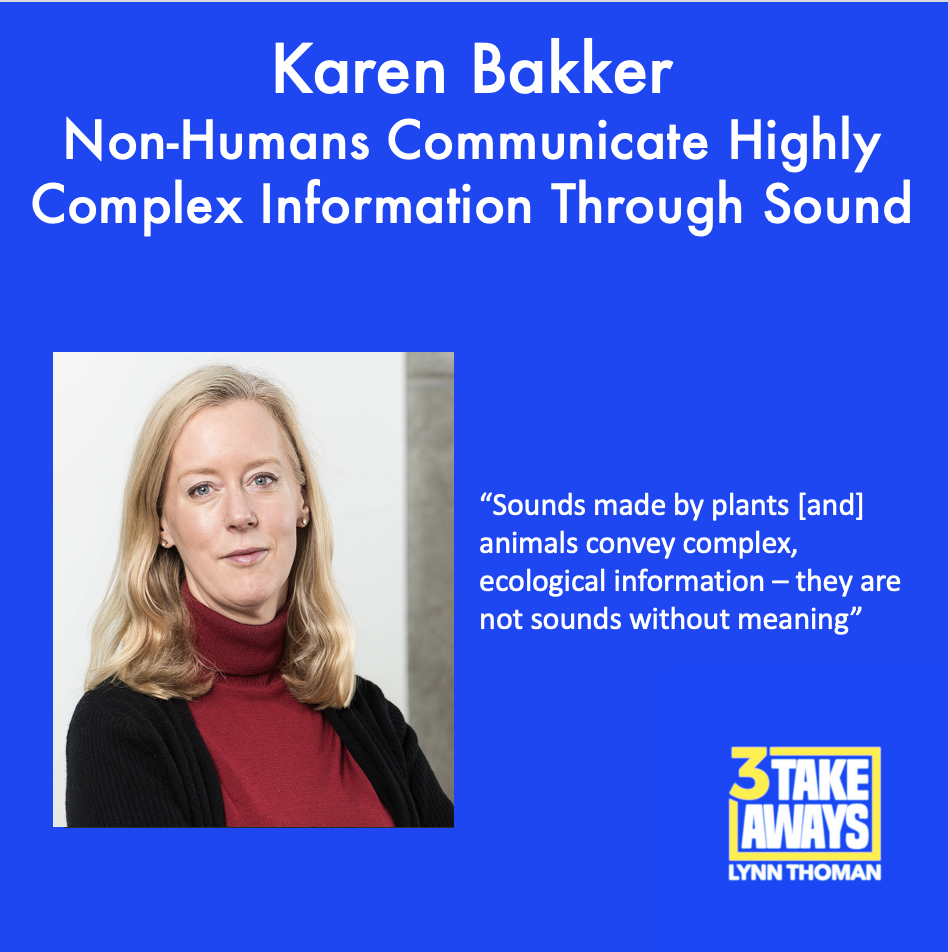
Now Hear This: Non-Humans Communicate Highly Complex Information Through Sound
Breakthroughs in bio-acoustic technology are enabling scientists, including Karen Bakker, to “hear” an astonishing assortment of sounds made by animals, insects, and even plants. The implications are stunning, will impact environmental governance, and may fundamentally alter our relationships with other species.
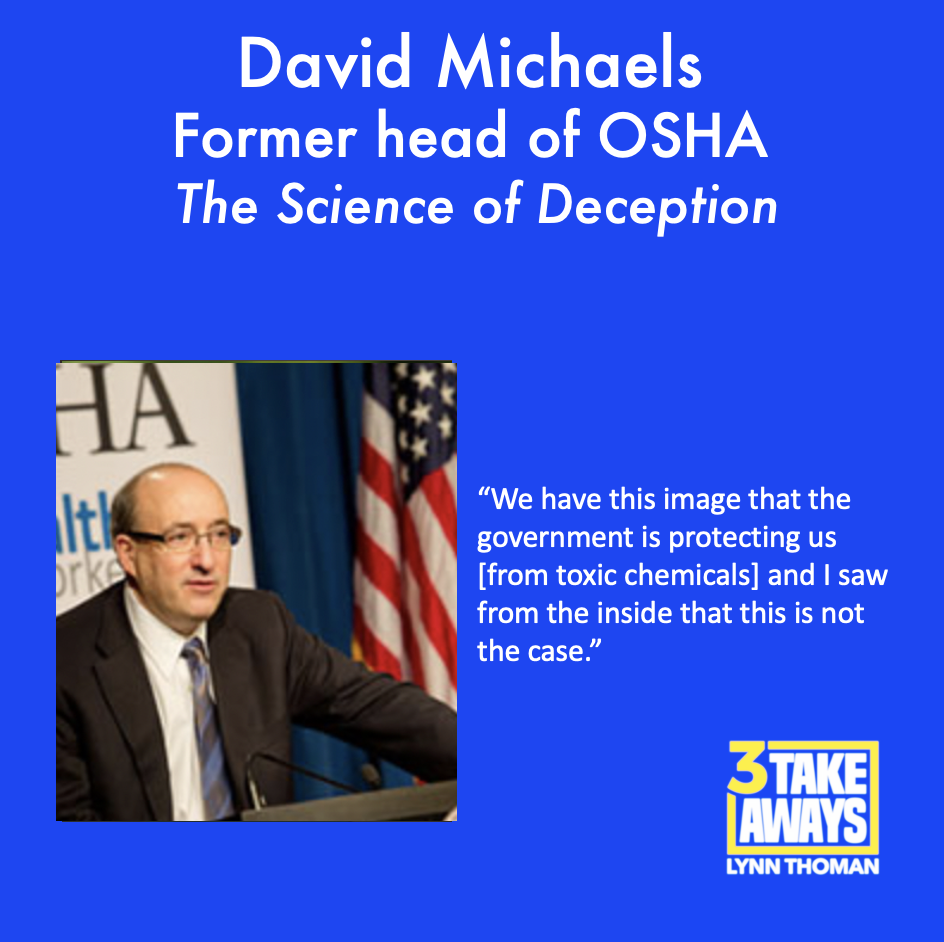
A Former OSHA Head Exposes the Science of Deception That Allows Dangerous Chemicals To Go Unregulated
There is massive, well-funded deception that enables many toxic chemicals and products to go unregulated — says former OSHA head David Michaels. He calls it the science of deception and the manufacture of doubt. Listen, as he explains in shocking detail how corporations pay for corrupt science and disinformation to influence government agencies, and where it’s happening today.
“We have this image that the government is protecting us [from toxic chemicals] and I saw from the inside that this is not the case.”
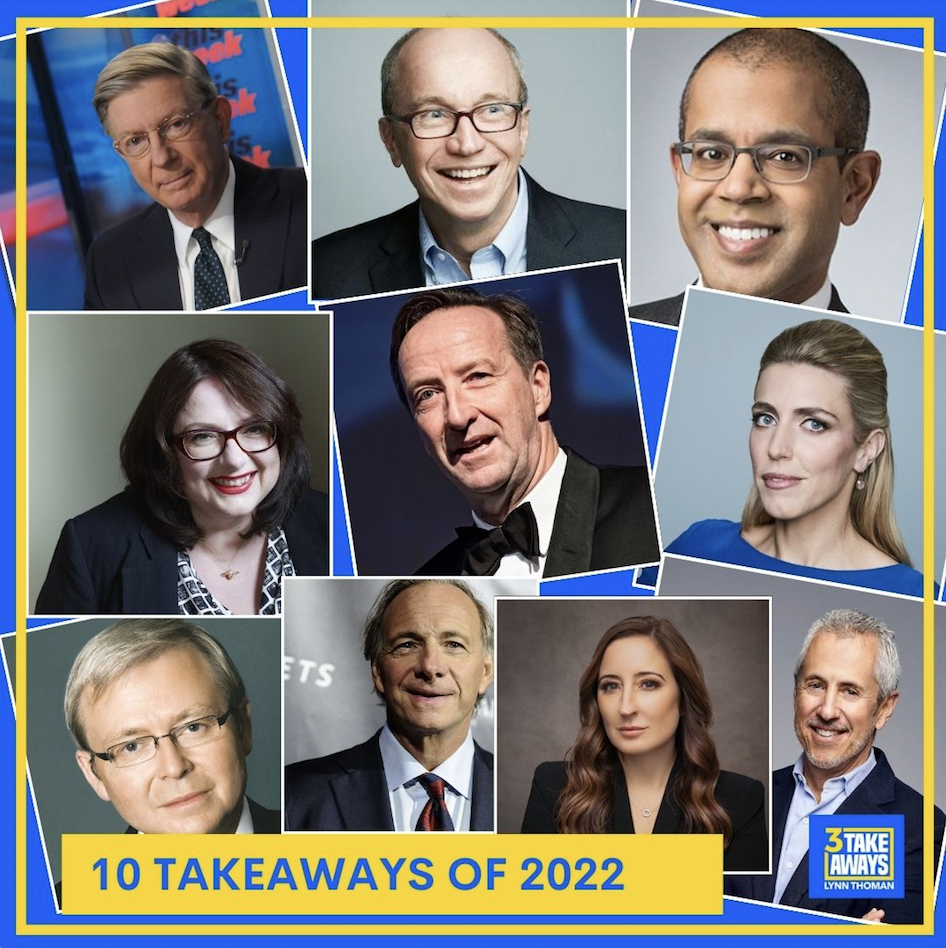
Which are the 10 Most Powerful and Compelling Takeaways of 2022? Listen and Find Out.
3 Takeaways features revealing conversations with the world’s foremost thinkers, business leaders, writers, politicians, scientists and other newsmakers, who each share three takeaways they consider vital. In this special year-end episode, we present the 10 most powerful and compelling takeaways of 2022.
Can you guess which takeaway is from each guest? The guests include:
Former Prime Minster of Australia
Former Chief of MI6
Founder of the world's largest hedge fund
7 other amazing guests

Climate Future: What We Know and Don’t Know with MIT’s Robert Pindyck
Current debates over climate change are focused almost entirely on reducing emissions - which is something we should do - but we also need to answer the question, how should we be adapting?
MIT’s Robert Pindyck shares what we know and don’t know and how we can adapt given the enormous climate uncertainty.
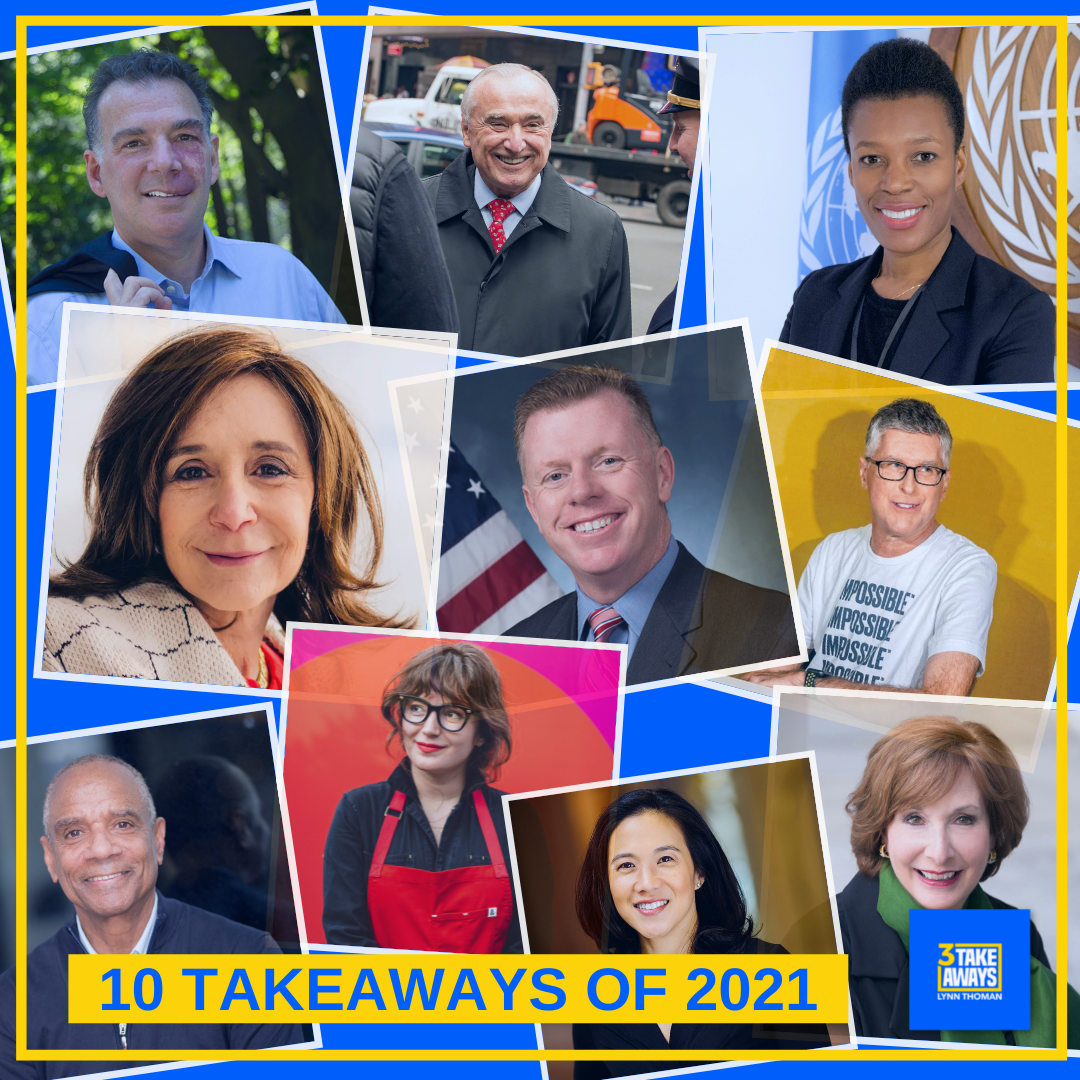
Always Be Learning: The Top 10 Takeaways of 2021 From Our Guests
This week on the podcast we are highlighting the Top 10 Takeaways of 2021. With guests ranging from CEOs and founders, to best-selling authors and even the Director of the U.S. Secret Service. These individuals left us feeling motivated and inspired!
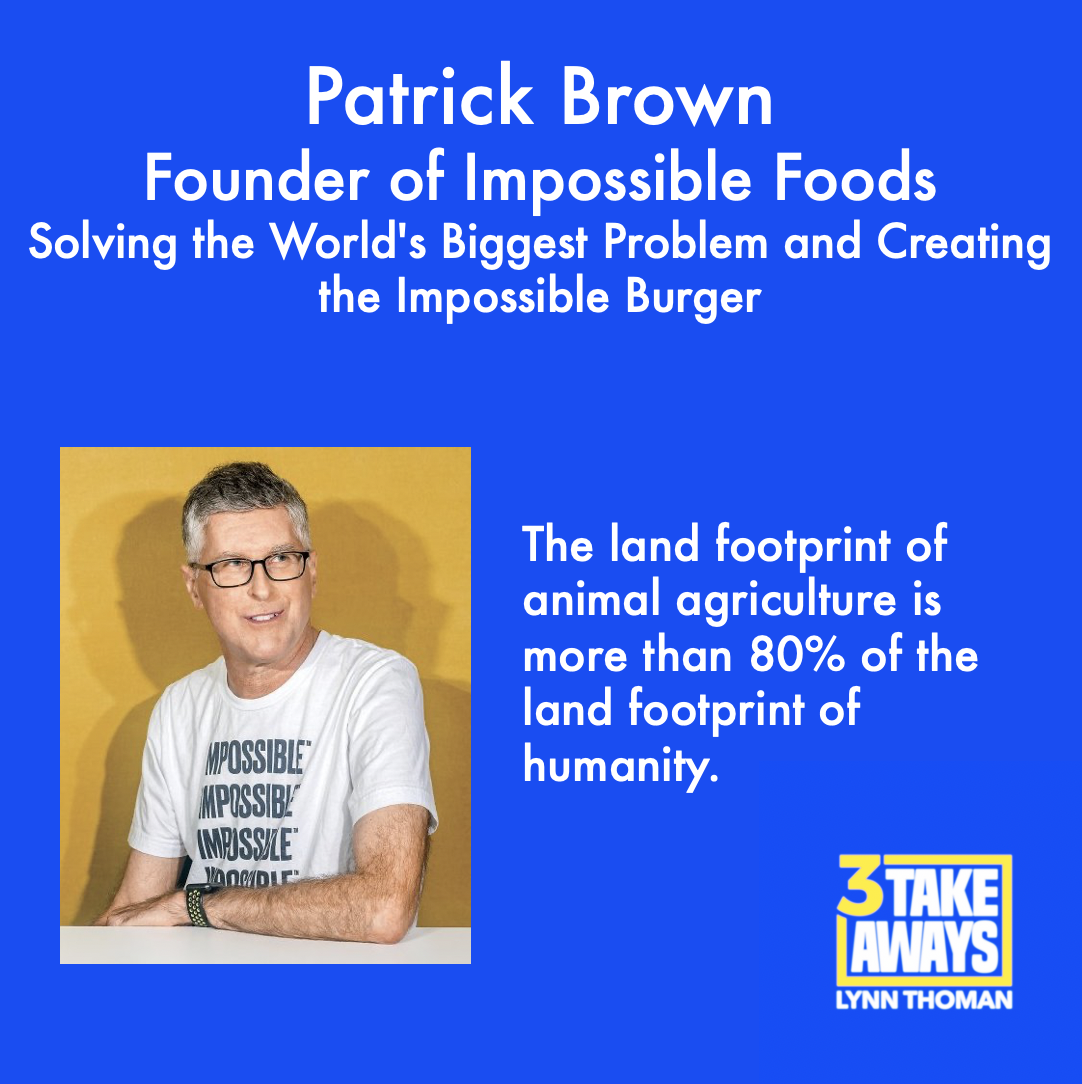
Solving the World's Biggest Problem and Creating the Impossible Burger with Impossible Foods Founder Patrick Brown
Meat production is one of the world’s greatest contributors to climate change. Patrick Brown, the creator of the Impossible Burger and the Founder of Impossible Foods, wanted to figure out how to make delicious, affordable meat from plants that is better for the environment and consumers. Learn about his journey from Stanford University professor to creating the Impossible Burger and how he built Impossible Foods into the multibillion-dollar company it is today.
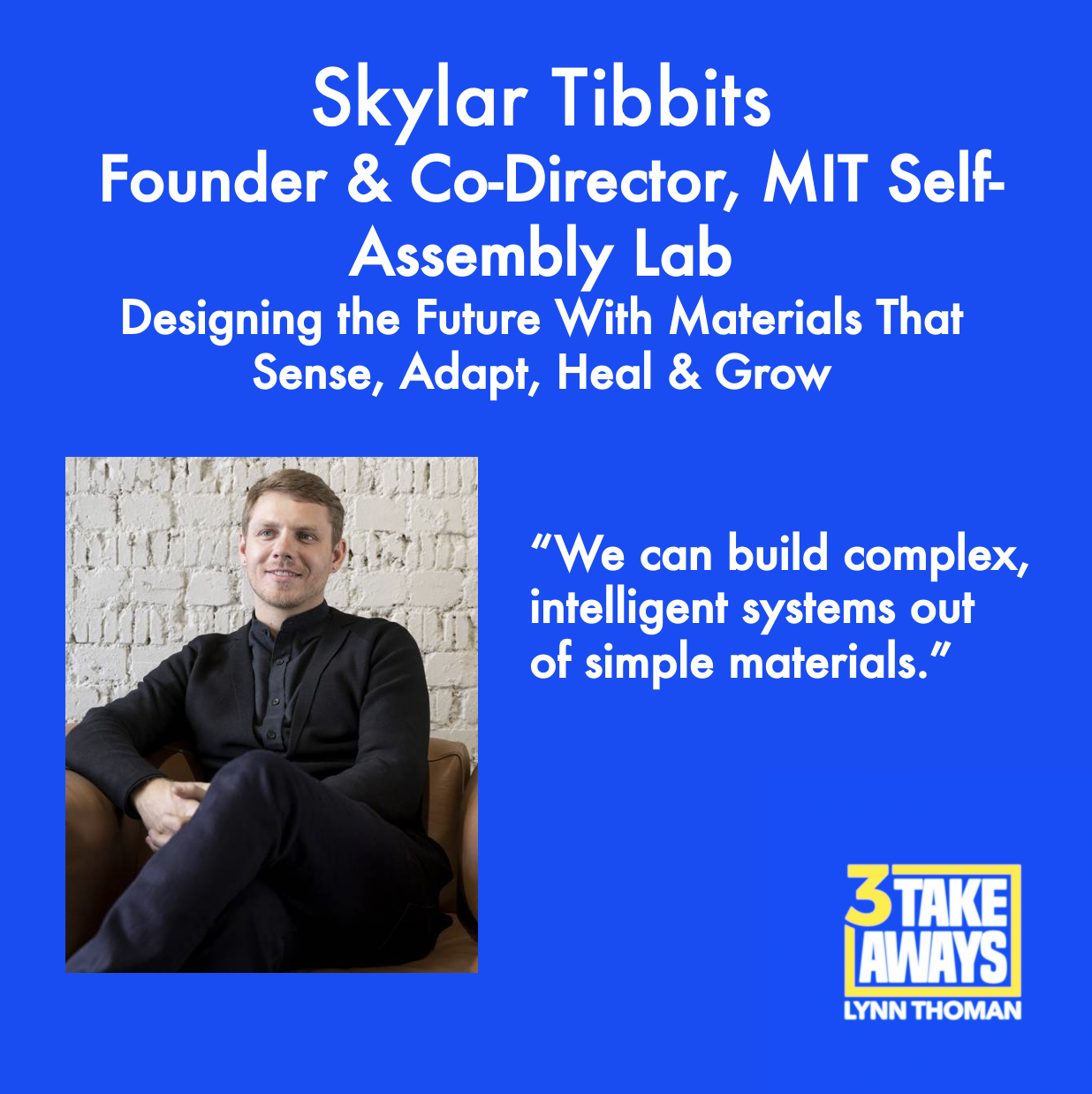
Designing the Future With Materials That Sense, Adapt, Heal & Grow: Founder of MIT's Self-Assembly Lab Skylar Tibbits
Imagine homes that can grow themselves whenever and wherever they’re needed or buildings that can adapt to their environment. We’re limited only by our creativity in designing materials that physically sense, adapt to their environment, heal themselves and grow. Skylar Tibbits shares how we can design simple and elegant materials that harness nature without electronics and batteries.
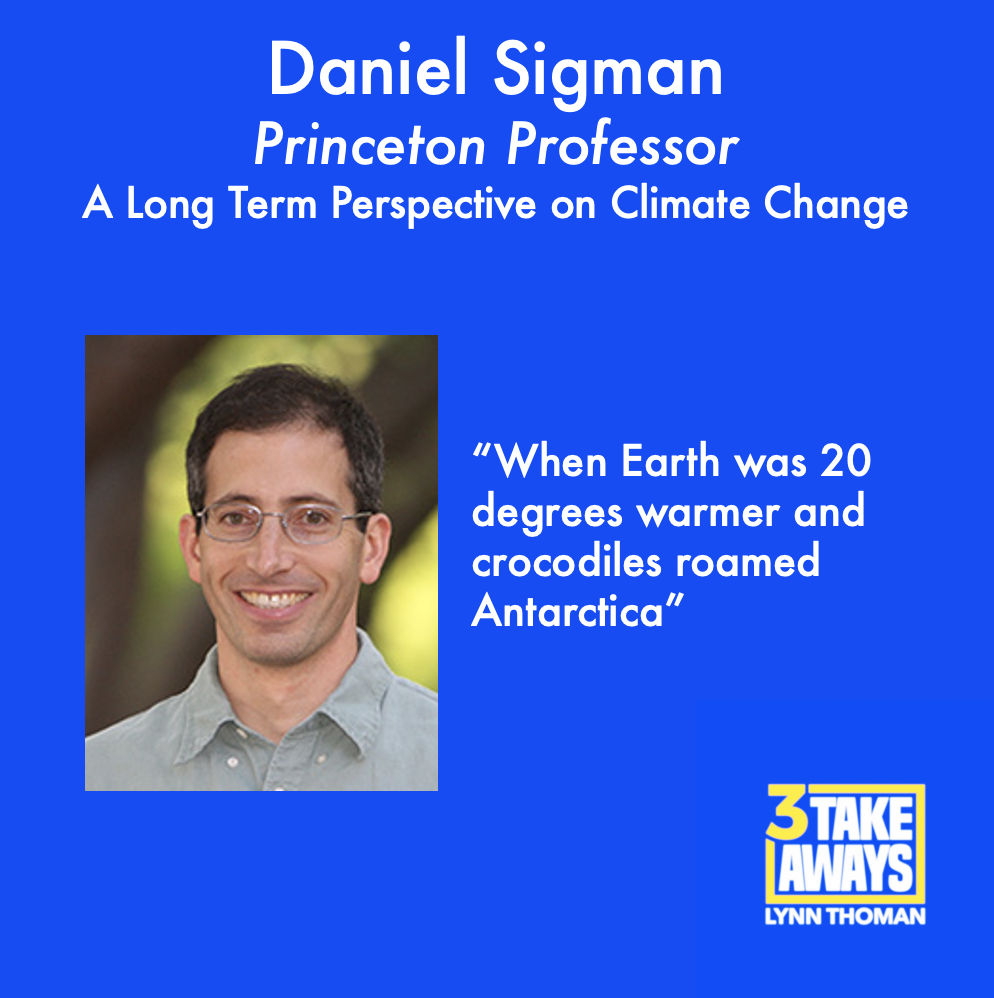
A Long Term Perspective on Climate Change - When Earth Was 20 Degrees Warmer and Crocodiles Roamed Antarctica with Princeton’s Danny Sigman
Did you know that Antarctica used to be ice-free and earth used to be 20 degrees warmer than it is now? Find out why climate change then wasn’t a problem, and why it is now with Princeton University’s Daniel Sigman. Also find out how climate change caused horses to grow from the size of large house cats to their size today.
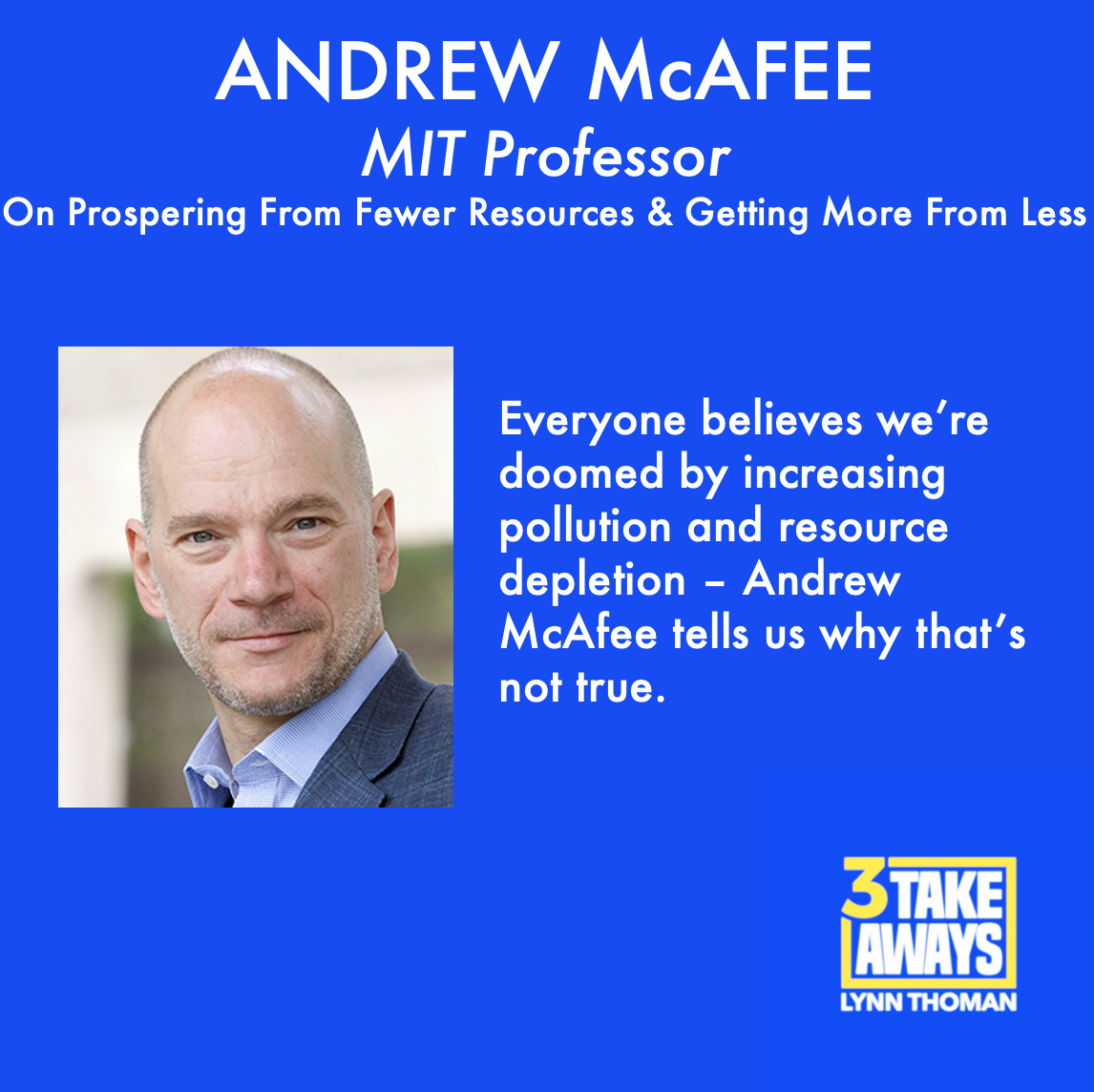
MIT Professor, Andrew McAfee: On Prospering From Fewer Resources & Getting More From Less
Most people believe that taking better care of the planet means reducing consumption, learning to share and reuse, and restraining growth. Is that argument correct? Find out from Andrew McAfee, director of MIT’s Digital Initiative, why it's not true.
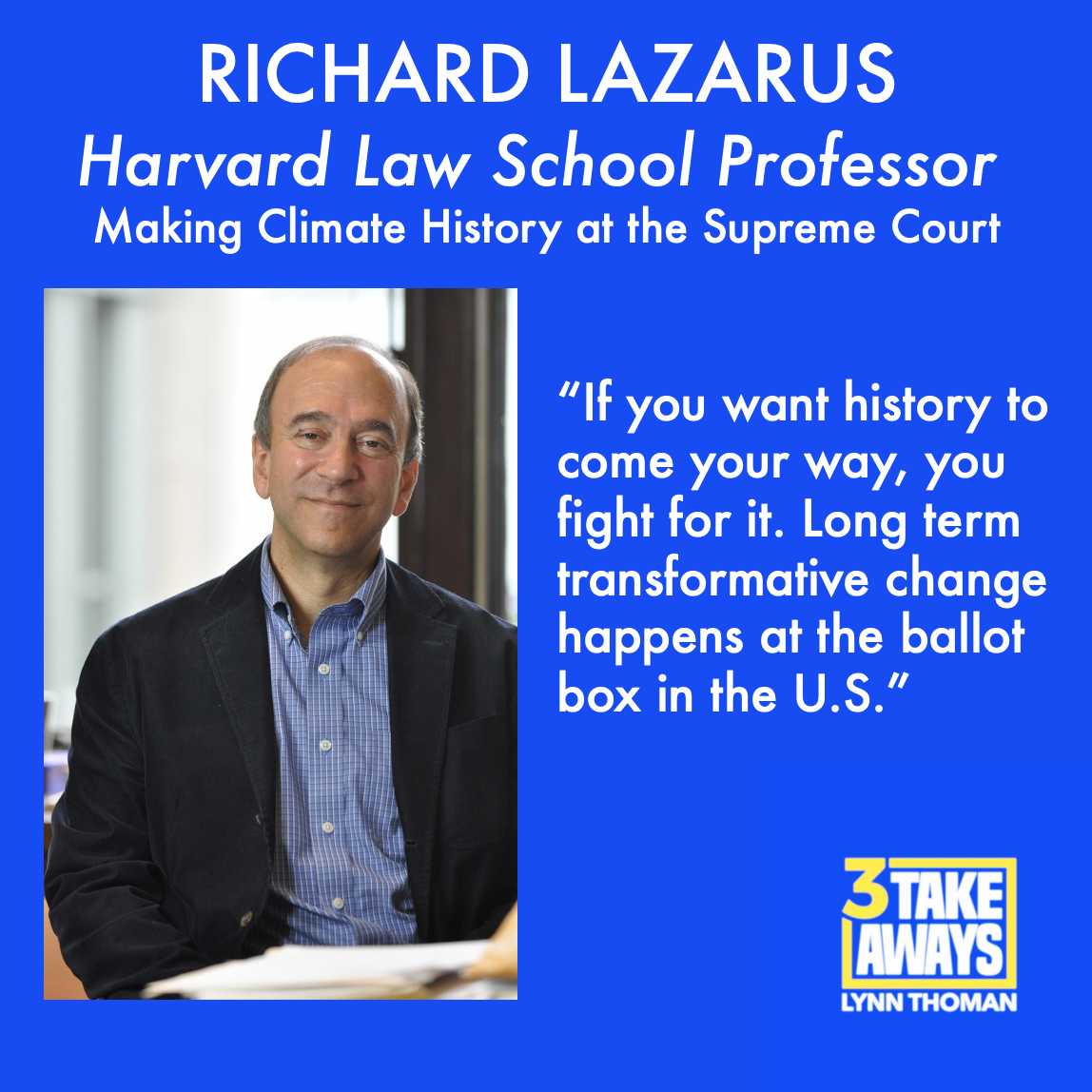
Harvard Law Professor, Richard Lazarus: Making Climate History at the Supreme Court
Harvard Law School professor Richard Lazarus tells the gripping inside story of the most important environmental law case ever decided by the US Supreme Court, what it took to win it and its sweeping impact. Lazarus offers a poignant reminder of the difference one person can make. See how far we’ve come―how far we still must go – and how one person made a difference and how you can make a difference now.
